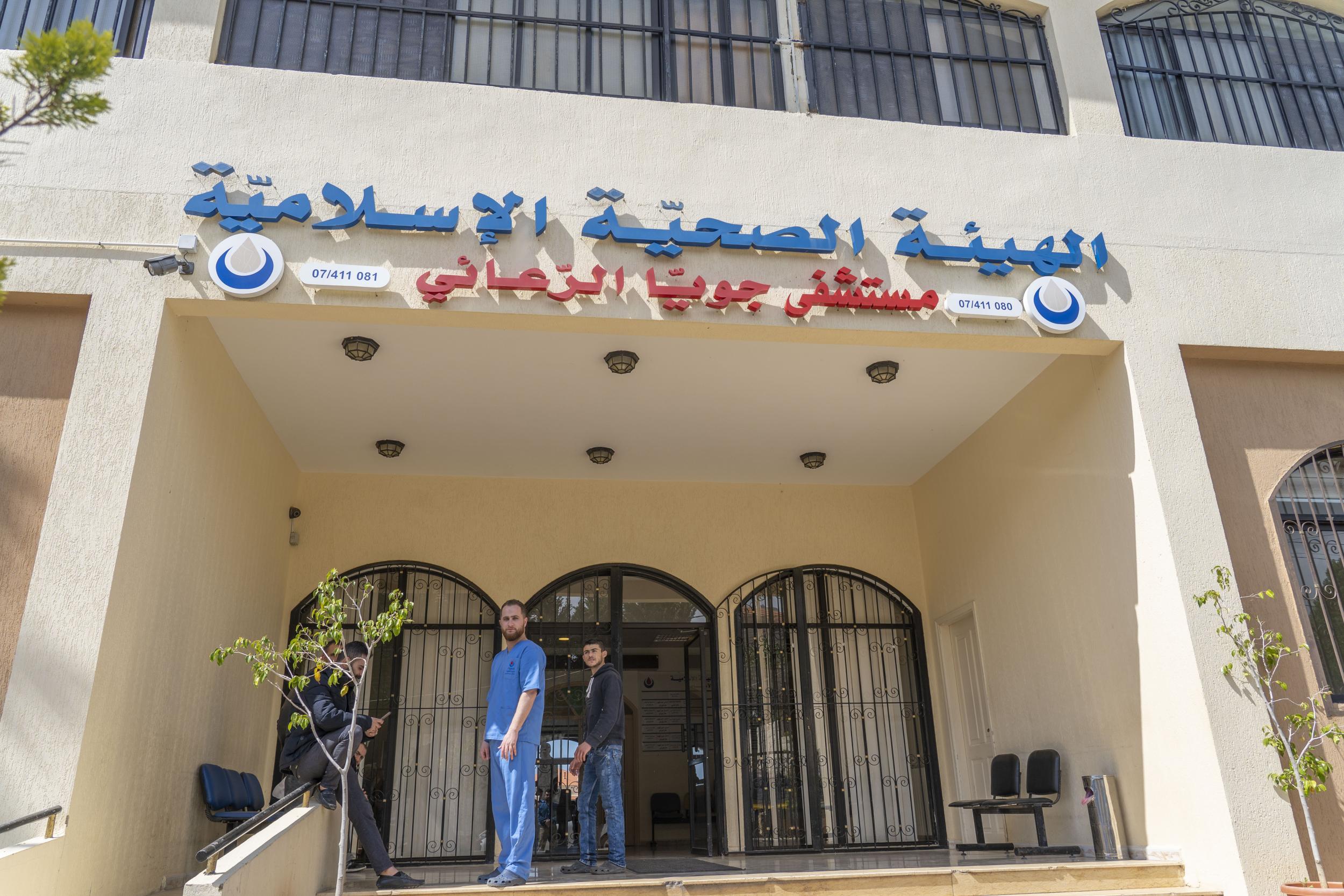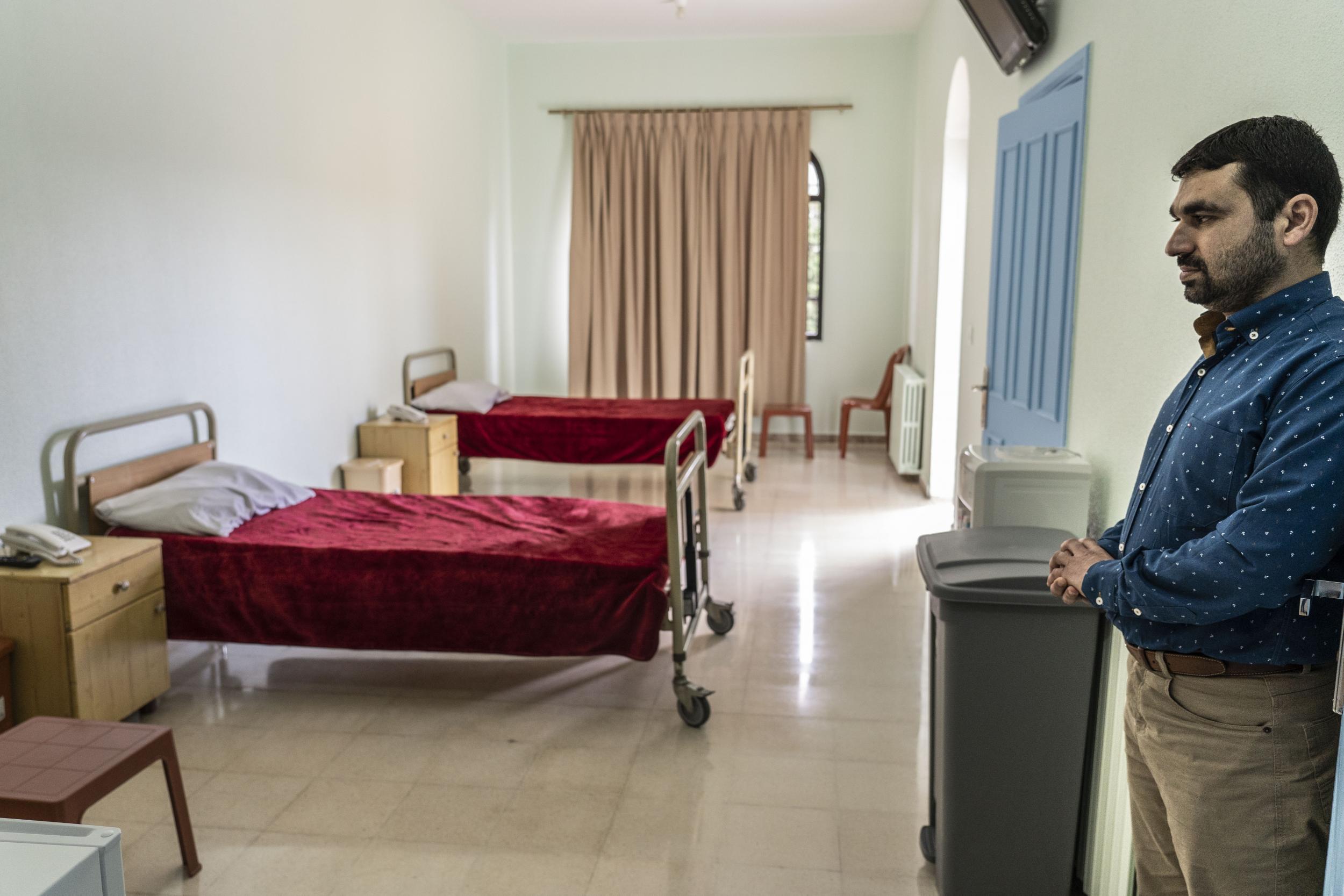Hezbollah launches its newest war, this time against coronavirus
Dismissing accusations it inadvertently brought the deadly virus to Lebanon, Hezbollah has rolled out a battle plan to tackle the spread of the disease
Your support helps us to tell the story
From reproductive rights to climate change to Big Tech, The Independent is on the ground when the story is developing. Whether it's investigating the financials of Elon Musk's pro-Trump PAC or producing our latest documentary, 'The A Word', which shines a light on the American women fighting for reproductive rights, we know how important it is to parse out the facts from the messaging.
At such a critical moment in US history, we need reporters on the ground. Your donation allows us to keep sending journalists to speak to both sides of the story.
The Independent is trusted by Americans across the entire political spectrum. And unlike many other quality news outlets, we choose not to lock Americans out of our reporting and analysis with paywalls. We believe quality journalism should be available to everyone, paid for by those who can afford it.
Your support makes all the difference.Lebanon’s powerful Shia militia and political organisation Hezbollah has, during its 35-year existence, fought against Israel, rival factions inside the country and Syrian rebels opposed to Bashar al-Assad.
Now the Iran-funded group says it is gearing up for an entirely new but equally tough battle: against the coronavirus.
“When an enemy arrives at your gate, you prepare for war,” says a Hezbollah representative, as a flurry of medics fan out in front of him prepping a new coronavirus hospital they have just set up.
The private psychiatric centre in Jwaya town, a Hezbollah stronghold located 95km south of Beirut, has been repurposed to hold 32 Covid-19 patients.
The basement, once home to a pool and indoor gym for its clientele, is being made over to house a four-room intensive care unit for the most critically ill.
The building will soon be stocked by ventilators that Hezbollah, designated a terrorist group by the US and the UK, has commandeered from nearby private hospitals it owns, which are not set up to handle people infected with the virus.
The building is one of more than a dozen similar coronavirus units the paramilitary organisation – dubbed “state within a state” – have set up across the south of the country, which in total they say have the capacity to treat 500 Covid-19 patients.
The units are part of a concerted effort by the group to win hearts and minds after they were accused of inadvertently bringing the virus to the country.
And so they have launched similar initiatives across the rest of the Hezbollah-controlled territories in Lebanon, including the Bekaa Valley and the southern suburbs of Beirut. Tens of thousands of the group’s supporters have been enlisted to help.
“Hezbollah has given its blood for Lebanon before, it will do so again,” says Dr Mohammed Sleiman, a hospital director who is in charge of Hezbollah’s coronavirus efforts in the south.
With a wave of his hand, he dismisses questions about the cost of this endeavour: “We have an open budget for this.”
“Hezbollah is not only supporting its own people. What we have created will support everyone across the country,“ he adds, saying they would treat people from all sects as well as refugees.
In a country of more than 6 million people, the Lebanese authorities have recorded just 673 cases and 21 deaths from the deadly virus, after imposing one of the region’s strictest lockdowns, which has closed all official land, sea and air borders.
But like many places across the world, Lebanon does not have extensive testing capabilities, and the true number of infections is not known.
Some believe there are clusters of cases concentrated in areas controlled by Hezbollah, brought in during ongoing cross-border movement of the group’s members and allies coming from Syria, Iraq or Iran, the epicentre of the pandemic in the Middle East.
Hezbollah vehemently refutes the reports.
Experts, citing people on the ground and western diplomats, claim between 4,000 and 6,000 people could be infected in Lebanon’s Hezbollah-controlled districts alone. The Independent was unable to verify these numbers.
But it echoed an assessment of the situation shared by many in the country at the start of the outbreak.
Just a few weeks ago, Twitter hashtags were trending in Lebanon blaming Hezbollah supporters for starting the outbreak because of its strong ties to Iran.
Fuelling the anger was news that the first diagnosed patients in Lebanon had indeed travelled to the shrine and seminary city of Qom, a regular destination for many Lebanese Shia pilgrims, which then became the heart of the outbreak in Iran.
Furious residents accused Hezbollah of staging an elaborate cover-up to hide the true infection rate, and tweeted images mocking Hezbollah officials “welcoming” the virus to Lebanon on planes.
Fast forward to April and, in a 180-degree turn, Hezbollah has been heralded for drawing on its vast manpower and resources to battle the deadly disease.
The group says it has marshalled 25,000 volunteers nationwide, rolled out fleets of ambulances equipped with coveted ventilators (70 in the southern area alone), built two testing centres and commandeered well over a dozen private medical centres like the one in Jwaya to battle the coronavirus.
Hezbollah says it has also deployed thousands of volunteers to distribute food parcels to those facing shortages, amid the crippling lockdown measures, soaring inflation and a financial crisis.
The group currently runs three hotlines for people with Covid-19 symptoms and one for those in need of psychological support. It has built what it has called its “spider network” of “social committees” to monitor the spread of the coronavirus, as well as provide for the needs of families hit by the economic fallout.
Abdulla Nourredin, head of civil defence for the group’s Islamic health society units in the south, tells The Independent Hezbollah had gathered 6,000 volunteers to help enforce the quarantine.
“We chat morning and evening with those suspected to have the virus to make sure they have the medical and food supplies they need and do not leave their houses,” he says.
“If we find people have violated the rules, we liaise with the local municipality and internal security forces.”
They have wasted no time in promoting these anti-coronavirus efforts. Hezbollah leader Hassan Nasrallah, invoking the language of war, has vowed the group will not “run away from this battle”.
Staging multiple bombastic press tours in Hezbollah strongholds of Dahieh, in Beirut, and Tyre in the south of the country, the group has taken reporters around fields lined with ambulances blaring their sirens and neighbourhoods flanked by men on foot liberally hosing down streets with disinfectant.
They have been also launched an outreach programme within the local community.
We got messages from Hezbollah saying come to their hospital if we get sick, I will rely on this
In Jwaya town, impoverished residents in the rundown neighbourhoods anxious about medical bills tell The Independent they started receiving text messages from local Hezbollah representatives telling them they could visit the group’s coronavirus hospitals for free.
“I’m a Syrian refugee, and we got messages from Hezbollah’s people saying come to their hospital if we get sick,” says Mohamed, 50, who fled Damascus in 2014 and feeds a family of six on just a few dollars a day selling filtered water.
He says soaring inflation in the country has seen the price of basic goods nearly triple: a bag of 5kg rice which cost 5,000 Lebanese pounds last year is now 15,000 Lebanese pounds (£8). The family has no means to pay hospital costs.
“On a personal level, I have nothing to help me. I will rely on Hezbollah’s Jwaya hospital. I am very thankful for this. I don’t know what I would have done if they didn’t arrange these things.”
Beyond fighting the disease, which threatens to rage through its supporters and swathes of the country, Hezbollah’s anti-coronavirus activities have successfully drummed up support for the group, which has struggled amid criticism from Lebanese citizens frustrated with the long war in Syria, and more recently from protesters in the country’s October revolution.
On Wednesday, users on Twitter began sharing a photoshopped image of a popular meme celebrating doctors in Italy, which showed a medic in Hezbollah’s yellow and green colours and assault-rifle-festooned logo.

“Without the leader Hassan Nasrallah, we would now be in graves with people reading [prayers] for our souls,” one supporter wrote on Twitter, sharing the image.
“May God protect you,” wrote another, attaching a photo of Hezbollah’s ambulances.
Unusually, Hezbollah’s coronavirus measures were launched completely independently of the health ministry and central government, which has designated Beirut’s Rafik Hariri University Hospital, the largest public medical centre in the country, as the epicentre of its response to the crisis.
This is despite the fact that Lebanon’s new health minister Dr Hamad Hasan is a Hezbollah-backed appointee and the group has close relations with the rest of the cabinet, which took office in January.
A Hezbollah representative tells The Independent their individual efforts were not meant to replace but rather “take the pressure off” the state.
But analysts say this was a deliberate move to “shift the narrative” from Hezbollah being the cause of the virus to it being the cure, as its popularity waned.
Hezbollah has a huge stake in the country’s public and private sectors, which were already floundering amid a near-unprecedented financial crisis.
“I think that Hezbollah needed to come up with a plan, not necessarily a health plan but a narrative emergency plan,” says Hanin Ghaddar, an expert on Shia politics at the Washington Institute think tank.
They want to shift the narrative from blaming Hezbollah for the coronavirus to Hezbollah being the only party to battle it
“They want to shift the narrative from blaming Hezbollah for the coronavirus spread to Hezbollah being the only party that has the resources to battle this,” she adds.
Ghaddar cites multiple sources and reports that she has culled in her research, suggesting that “Hezbollah is hiding a lot of cases”.
Hezbollah representatives dismisses the reports, pointing to their efforts to fight the disease, but acknowledges being damaged by the allegations.
“The criticism on social media and claims we had brought the virus here were a big challenge for us,” says Dr Sleiman.
“But we do not care about these criticisms, we reacted on the ground to stop this virus expanding,” he adds, saying there are only three confirmed cases of coronavirus in the southern areas he oversees.
Other political factions within Lebanon have also been keen to publicise their anti-coronavirus efforts, reasserting their dominance as state facilities have buckled under pressure.

The Druze-led Progressive Socialist Party and Christian-led Free Patriotic Movement have also been sending out sanitising trucks in their areas of support, with party branding and slogans on the trucks, as well as political party anthems blaring from speakers.
However, as Mohanad Hage Ali of the Beirut-based Carnegie Middle East Centre says: “Hezbollah is in the lead.”
Back in the Jwaya coronavirus wards, Hezbollah’s doctors say they have “no fears” concerning the deadly disease, and are confident they will triumph.
“We have taken several courses on how to deal with such cases, we are prepping isolation hospitals, we even started producing ventilators,” says Jihad Hussein, a surgeon.
“We have a system; there is nothing to be worried about. We are ready for anything.”
- Additional reporting by Samira el-Azar

Join our commenting forum
Join thought-provoking conversations, follow other Independent readers and see their replies
Comments